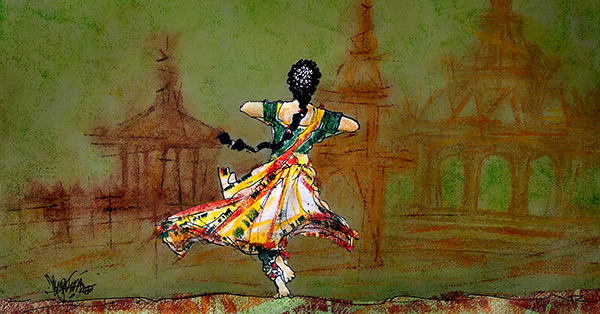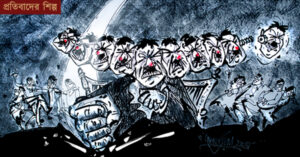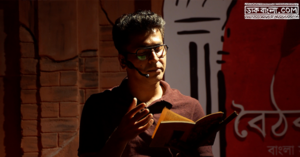Chilla: Part 1
Students of Hindustani music undergo rigorous and prolonged training spread over several years. Some are advised by elders and gurus to observe a ritual called “chilla”, which traditionally involves isolating oneself from the world and its distractions to be able to practice for a predetermined period of time. A chilla therefore is meant to be a time for introspection and for elevating one’s practice.
Let’s do a chilla — Nirmala Malviya announced and suggested in the same breath. Her face, beaded with perspiration from the exertion she had undergone, beamed in excitement as if she had suddenly hit upon a brainwave. In contrast, the three other individuals in the room rehearsing with her for her forthcoming Kathak recital seemed totally disinterested in her announcement, as if they couldn’t care less. But Nirmala was certain, more so than she had ever been before, that the chilla idea was certain to illuminate her path to the stardom destined for her. Noting the disinterest of her accompanying musicians, she declared once again-
Did you hear what I said? Haiiin? I’m going to do a chilla.
Unable to elicit even a tepid response from the three musicians, she frowned and told herself —
Let them remain ignorant. What do they care? They accompany anyone and everyone who pays their fee, and bend backwards for anyone who is willing to give them a ‘foreign’ trip. They will never understand the significance of what I am going to do, or my passion for my art. After all a chilla is something spiritual, part of sadhana. It’s about making a vow and then having the mental strength to complete the vow. The only vow they will ever understand is to extract more money from all possible sources! I am convinced, and I will go ahead as I want to. From this year onwards I will not do an annual performance. Instead, I will do a chilla. And my goal will be to set a Guinness record this year, and break my own record and set new records every following year! Waah! What fun!
The three men in the room waited stoically for her all this while, but not in silence. All three were musicians who earned their livelihoods by accompanying dancers, providing tabla, pakhawaj and vocal accompaniment. The leader among them was obviously Ganga Prasad Mishra, Banarasi to the deepest core of his quaintly charming paan-infused and stained being. All this while, as Nirmala the diva ruminated, his fingers had fluttered lightly over the tabla, playing a relaa, tossing his ash coloured, greasy locks around to stress special techniques with the air of a showman. Seated next to him was the younger Prithvi Kumar Mishra, also from Banaras, who played pakhawaj. As the older man played, Prithvi let out an occasional “waah chachchaa “ of appreciation. The third member of the ensemble was Pinaki Lenka, a vocalist nicknamed Pinku by his colleagues. As the two Banaras clansmen interacted with each other, Pinku sat aloof staring into his mobile phone, sending and attending to WhatsApp messages and FB alerts.
Ganga Prasad Mishra was a highly coveted tabla accompanist for Kathak dance at the time. Every Kathak dancer in Delhi rushed to hire him for performances the moment they got whiff of a possible opportunity. Some even booked him in advance, even before a proposed performance was confirmed on paper, never mind the cancellation fee he had started imposing if the event did not materialise eventually. Visiting Kathak artistes too hurried to book him if they wished to make a mark in the capital, gladly relegating their long time accompanists to junior position in the orchestra, or designating another role for them- that of doing padhant or reciting syllables while Ganga Prasad led the orchestra dressed in dazzling brocade kurtas, and sporting a gigantic medallion studded with “AD au kishtal” or American diamonds and crystals”. Dancers who were weak on riyaaz or less accomplished, wanting in the area of complex rhythm management, or unable to memorise complex repertoire, prized Ganga Prasad or Ganga Bhaiyya as he was referred to, even more than others. Ganga Bhaiyya remembered all compositions, tukdas, parans, tihais, chakradars, everything, virtually like the back of his large be-ringed hand. He also assessed in a trice the weaknesses of the dancers he was invited to accompany, and operated on the shrewd strategy that if he assisted them in camouflaging their mistakes, they were more likely to trust him and prefer his accompaniment to that of others. On several occasions, when a dancer expressed nervousness at the possibility of making a mistake and being caught out by discerning audiences, he would instantly curl his lower lip upwards to keep the paan from dribbling out when he spoke, and declare -Why Mydum (Madam), why? Hum hain na ! His trademark Hum hain na, indicating that he was there to help her tide over difficult passages not only assured the nervous dancer but also ensured that when she made an entry on stage and performed the customary salute to each member of the accompanying team, Ganga Bhaiyya always got the most fervent and heartfelt pranaam. On one occasion, he was even known to have declared grandiosely that ‘that philum walla, Karan Joharwaa” had got the title for his film “Main Hoon Na” from his trademark assurance of “Hum hain na”. He discarded the claim later thanks to Prithvi who quickly corrected him saying “ Aray chachcha, ‘Main Hoon Na’ Joharwaa thode hi banaya hai, oo tau Pharaa Khan (he meant Farah Khan) banayi hain.
Nirmala Malviya had for the last 15 years, ensured that Ganga Bhaiyya accompanied her for every dance recital she organised and performed. Yes, that’s right. It was Nirmala who organised her performances every year from start to finish. No one ever invited her, although she had moved heaven and earth to ensure that organisers and presenters noticed her. Nirmala truly believed she was born to dance but for all her commitment and true love for dance, had never really been able to hold a mirror to her many weaknesses. Incredibly good-natured and pleasant, she was lovable to the core, and had many admirers among friends and family. And yet, her dancing regularly made audiences lapse into paroxysms of uncontrollable laughter or even wide-eyed shock, while she remained steadfast in the belief that she was a diva, dedicated to her art, and ignored by presenters only because she was neither characterless and willing to sleep around for favours, nor was she able to market herself as other less-talented colleagues did. Finally, weary of waiting for invitations, she opted for self-reliance. Every year, she hired the massive Siri Fort auditorium, the largest in the capital, with a capacity of almost 2000 seats, to organise her own performance. Classical musicians and dancers usually tended to avoid such a large venue, aware of the risk involved in ensuring a full house. Nirmala was not to be daunted by any such consideration. She worked tirelessly every year to ensure that she not only got a large audience, but an audience densely populated by VIPs, celebrities, the powerful and wealthy in the capital. She never got a full house, not once in fifteen years, but so what? She had all the right and important people attending, albeit for a few minutes only, before they slid away for some pressing engagement that demanded their presence.
Before her guests made their quick get-away, they had to submit to a ritual on Nirmala’s personal request. Nirmala’s performance would be halted by the compere whenever a VIP guest arrived, they would be escorted to the stage where they would be exhorted to deliver “do shabd”, supposedly a meagre couple of words, in praise of Nirmala Malviya’s contribution to the world of Indian culture and dance. Their fulsome praise for their Nirmala ji, Nirmala didi or Nirmala bhabhi was duly recorded on the three-camera set -up mounted for the purpose. As they wrapped up their eulogies, Nirmala’s secretary Bina would emerge from the wings followed by a young sari-clad stage hand bearing a large silver tray on which were placed two bouquets of fresh flowers. First Nirmala would offer a bouquet to the visiting celebrity or VIP for sparing time from his or her busy schedule. A reciprocal bouquet would then be offered by the guest to Nirmala. Bina always ensured that the exchange of bouquets was duly captured on still cameras and video, and then respectfully escorted guests out of the auditorium and into their waiting vehicles. By the time she returned to the auditorium, Nirmala would be back at work, stamping wildly, flailing her arms around uncontrollably in movements that could not possibly be identified as Kathak. Assured that all was well, Bina turned her attention to the typed list in her file to work out who would make the next get-away and at what time.






